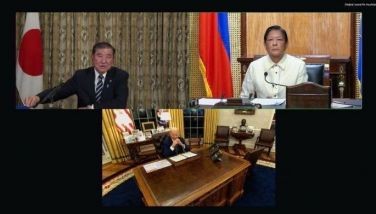Ban on OFW deployment to Lebanon stays
MANILA, Philippines - The Philippine government’s deployment ban to Lebanon stays since there is still no law in that country to protect foreign workers, including overseas Filipino workers (OFWs), an official said yesterday.
Philippine Ambassador to Lebanon Gilberto Asuque, in an interview aired over Vice President Noli de Castro’s weekly radio program, said the Philippines is waiting for Lebanon to approve a law protecting foreign workers.
“There are no laws to protect Filipinos there. Their labor laws only apply to Lebanese. They saw there were things that needed to be addressed. We are letting Lebanon draw up the law, which is an internal matter,” he said.
In June, the Philippines invited the Lebanese government to send representatives for a second round of talks to further negotiate a proposed memorandum of agreement on labor cooperation aimed at protecting the rights and promote the welfare of Filipino workers in Lebanon.
Both countries are also negotiating a protocol on household service workers as part of their talks.
“We appeal to our countrymen not to go to Lebanon until there is enough protection for Filipino workers,” Asuque said.
Meanwhile, Asuque belied claims of some Filipino workers who ran away from their Lebanese employers and sought shelter at the Filipino Workers Resource Center (FWRC) at the Philippine embassy in Beirut that they were detained in the basement of the building.
“They are not detainees because they are not imprisoned. The detainees are the ones who are brought to the immigration centers. Here (at the FWRC), they are free to roam the building. They can’t go out because they don’t have immigration papers,” he said.
Asuque said the government has funds to repatriate the Filipino runaways but those who remain at the FWRC have problems with their Lebanese employers, who refuse to give them exit clearance.
He said some Lebanese employers, before granting runaway OFWs an exit clearance, demand $3,000 to $4,000 for the amount they paid for the OFW’s work permit, immigration fee, and recruiter’s fee.
Asuque said 236 OFWs were repatriated from January to October this year. – Pia Lee-Brago
- Latest
- Trending































